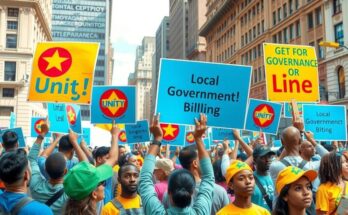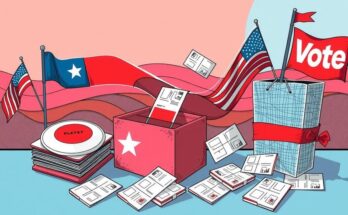Ecuador’s elections on February 9, 2024, occur amid escalating violence, a significant security crisis, and public disillusionment with current leadership. Voters, including those impacted by personal tragedies, face choices between President Daniel Noboa’s hardline policies and alternative solutions proposed by candidates like Luisa González, who offers a community-based approach. The outcomes will critically shape Ecuador’s future amidst challenges posed by organized crime and an energy crisis.
Ecuador is facing its general elections on February 9, 2024, amid a severe security crisis that influences voter sentiment. Citizens, including Shirley Tobar, a resident of Guayaquil, grapple with personal tragedies linked to the violence which has surged since 2019. The homicide rate has risen dramatically, reflecting the rampant influence of organized crime and political instability in a nation once regarded as one of the safest in Latin America.
Under President Daniel Noboa’s leadership, Ecuador has experienced a dramatic increase in violence, with gang warfare escalating. The country currently struggles with organized crime, corruption in the government, and an energy crisis marked by rolling blackouts due to inadequate infrastructure. As voters return to the polls, they must choose whether to support Noboa’s stringent security measures or seek alternative solutions presented by other candidates.
Noboa, who assumed office after the previous president’s departure amid political turmoil, is one of sixteen candidates contesting in the upcoming elections. His policies emphasize foreign investment and internal security, a response to an alarming rise in crime that has displaced thousands. Despite claiming a decrease in homicide rates, public sentiment remains skeptical due to frequent reports of severe violent crimes.
Various candidates, including opposition figure Luisa González, present contrasting approaches to the security dilemma, with some advocating for military intervention while others promote social investment to combat crime. González criticizes Noboa’s management, arguing that his hard-line policies have failed to produce the promised security improvements.
Ecuador’s ongoing energy crisis complicates the political landscape further, exacerbated by last year’s drought impacting hydroelectric power generation. This situation has led to significant economic losses, triggering accusations against Noboa regarding his crisis management. González has capitalized on this issue, leveraging it to challenge Noboa’s effectiveness in office.
Despite a divide in policy approaches, the influence of former President Rafael Correa’s political movement, Correismo, is significant. Correa’s legacy, characterized by social program expansion and economic stability, resonates with many voters disillusioned by current governance. With Noboa’s rapid rise highlighting a demand for new leadership, voters are now confronted with a critical choice regarding the country’s direction.
The upcoming election serves not only as a referendum on Noboa’s presidency but also as an opportunity for voters to express their discontent and desire for meaningful change. However, the predominant focus remains on personalities rather than substantive policy differences, reflecting the political crises that have plagued the nation. As Ecuadorians navigate their choices, the election outcome will have profound implications for the country’s future.
In recent years, Ecuador has deteriorated from a relatively peaceful state to one engulfed in violence largely attributed to organized crime and political instability. The country’s security crisis has seen its homicide rate soar, signaling deep-seated issues in governance and public safety. Corruption and an ongoing energy crisis further complicate the situation, creating an environment of distrust among citizens. In light of these developments, the upcoming elections serve as a pivotal point for the electorate, who must decide whether to support the incumbent president’s strategies or seek alternatives in leadership.
The election in Ecuador presents a crucial opportunity for voters to redefine their leadership amidst a pervasive security crisis and economic instability. With President Daniel Noboa’s hardline strategies in question, candidates like Luisa González propose alternate approaches to regain safety and stability. As the electorate prepares to cast their votes, the choices they make will undoubtedly set the tone for the nation’s political landscape in the coming years, reflecting broader sentiments of the populace regarding governance and public trust.
Original Source: foreignpolicy.com




